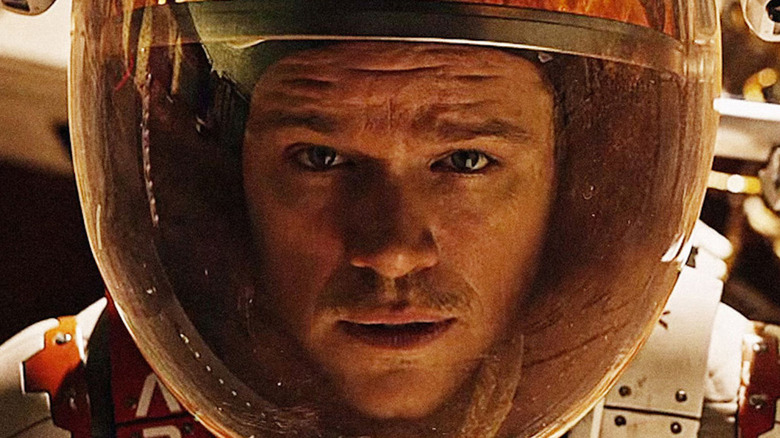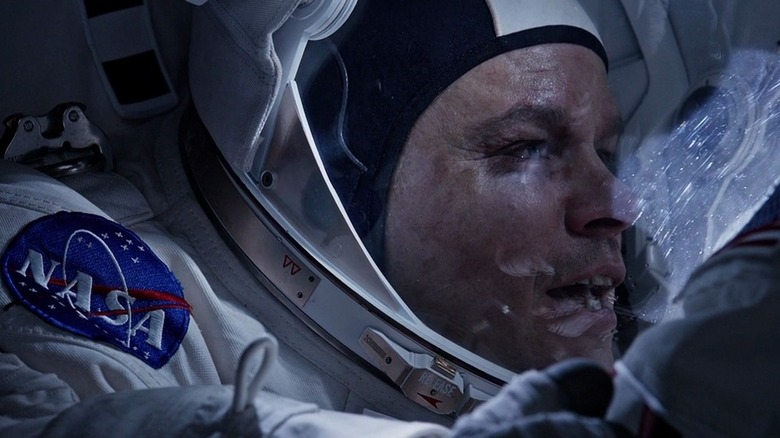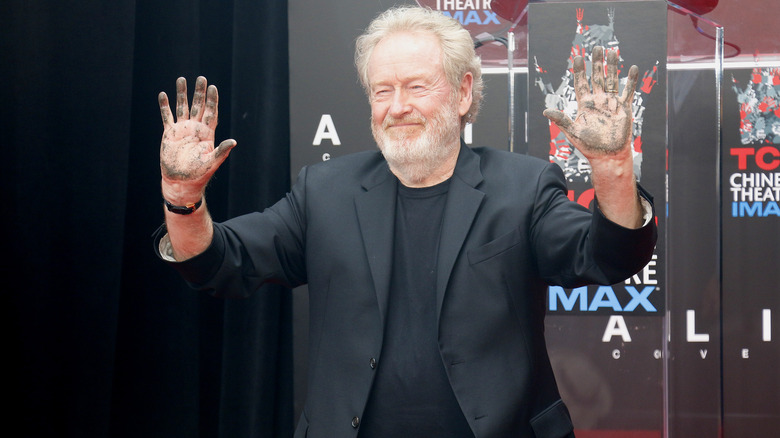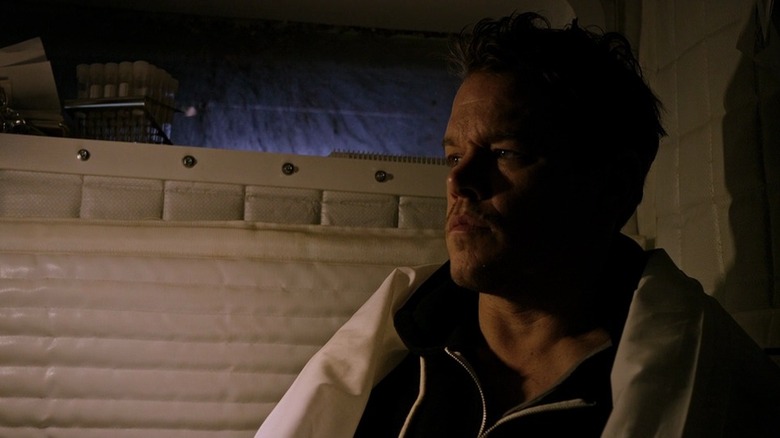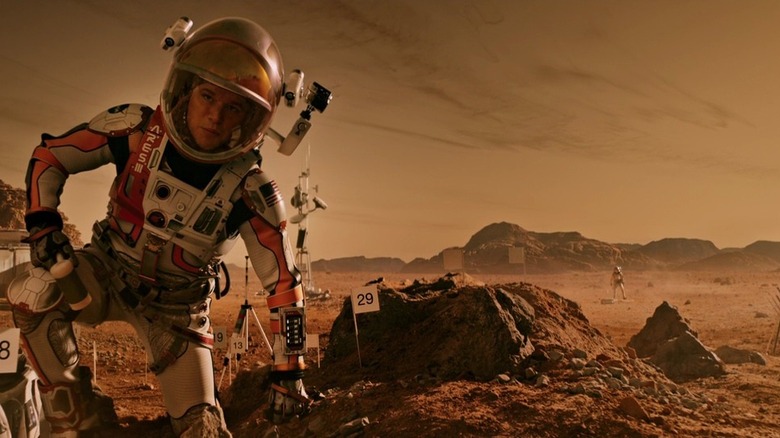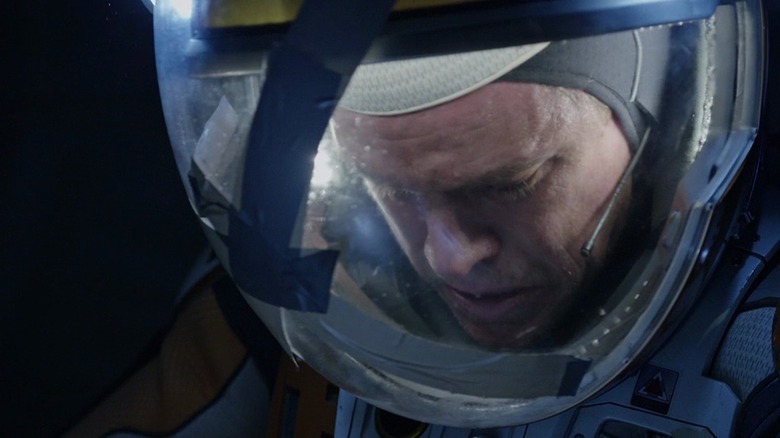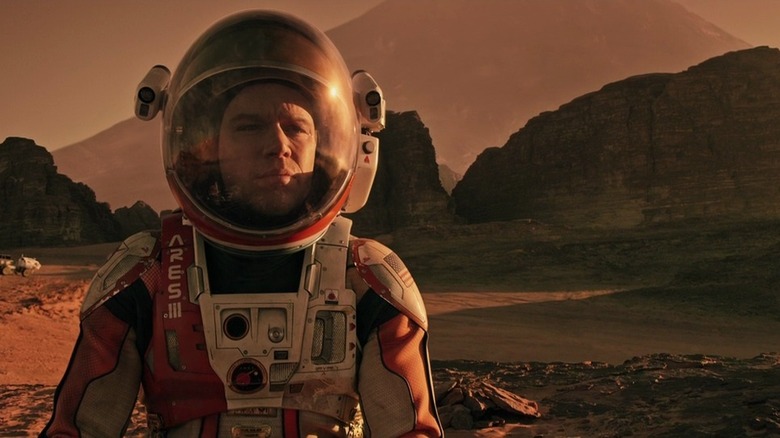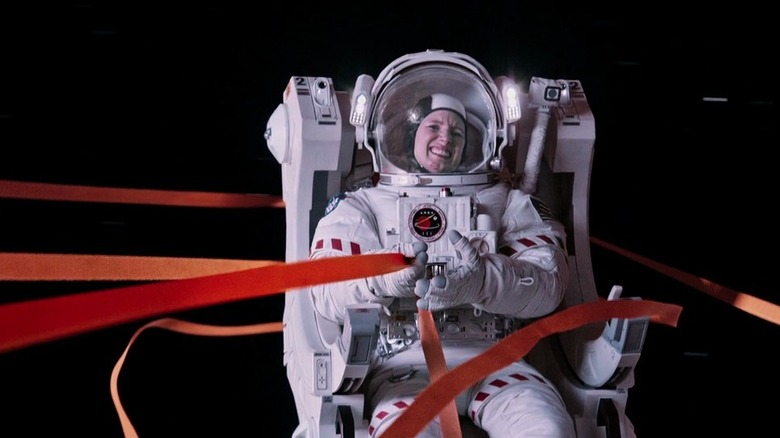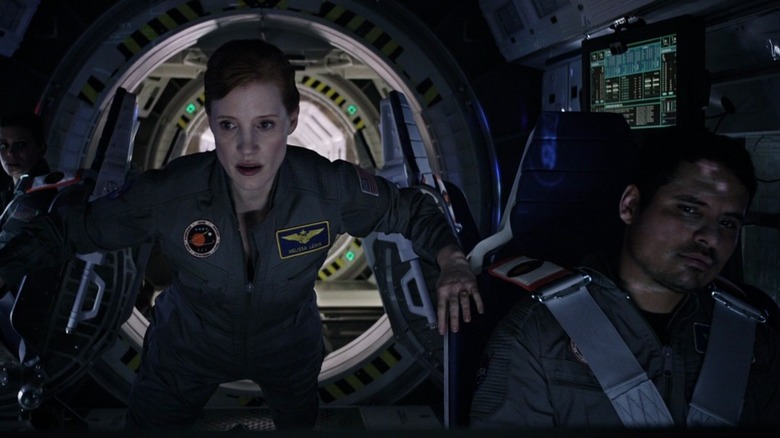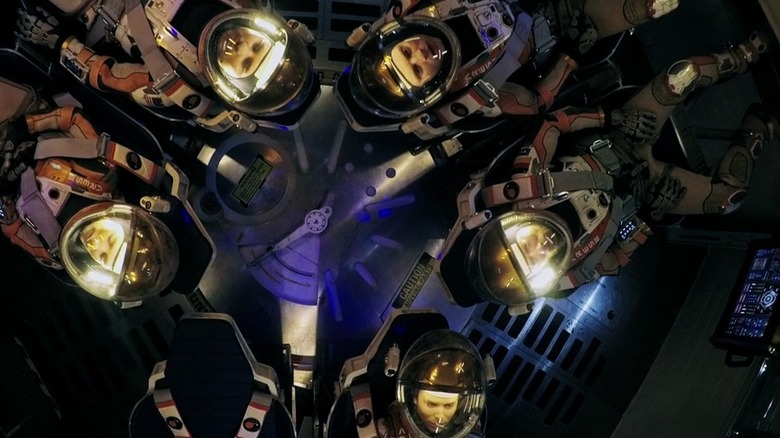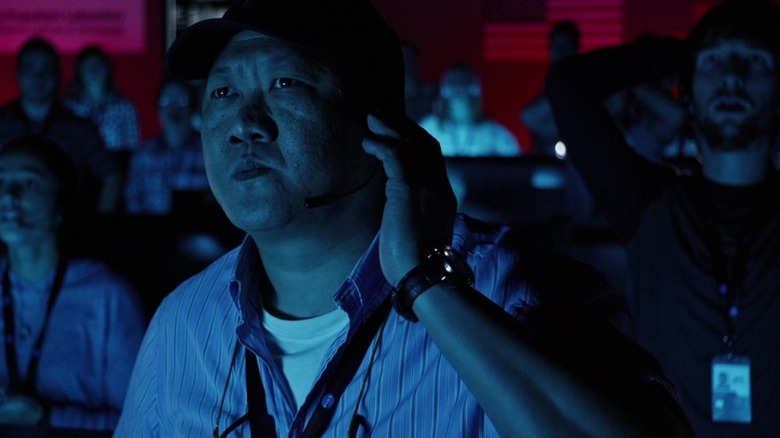The Untold Truth Of The Martian
In 2015, audiences got to blast off with the thrilling feature "The Martian." A movie about a man stranded on the surface of Mars had the potential to be devastating and solemn. However, director Ridley Scott, screenwriter Drew Goddard, and a stacked ensemble cast adapted the Andy Weir novel of the same name into something that kept you on the edge of your seat and more than a hum of optimism soaring in your heart. Rather than be a cold isolated work of cinematic storytelling, "The Martian" is an ode to perseverance and people working together in the face of unimaginable odds. It's no wonder such a compelling and enjoyable project became a global smash hit at the box office as well as an award-season darling.
While most people have seen "The Martian," possibly even multiple times, there are still oodles of details about this Ridley Scott feature that are far less well-known. From the original director assigned to this feature to the details about this film that attracted its top-tier cast, to even the role NASA played in making sure the film felt as authentic as possible, there are so many details to dig into with this film. So strap in and prepare to rocket to a whole new understanding of the exceptional crowd-pleaser, "The Martian."
The original director of The Martian
Today, "The Martian" is deeply associated with filmmaker Ridley Scott, but he wasn't always the first choice to helm this film adaptation of the beloved novel. When the project was first getting underway, "The Martian" screenwriter Drew Goddard was slated to helm the feature. This would've been his second feature-length directorial effort following the 2012 cult hit "The Cabin in the Woods." Goddard proceeded to write this feature and even secured the casting of Matt Damon as Mark Watney in the process. All signs appeared to be good for him to direct.
However, Goddard revealed to The Hollywood Reporter that his departure from "The Martian" was all about timing. Specifically, he had also signed on at that time to direct a "Sinister Six" movie for Sony that was originally set for a 2018 bow. When that production got pushed up to a projected 2016 premiere, Goddard had to bow out of "The Martian" and take on that other commitment. Eventually, "Sinister Six" would sputter out and Goddard would have to wait until the 2018 title "Bad Times at the El Royale" before he got to helm another feature-length project. There's no ill will on Goddard's part, though, as he's often mentioned that he felt Scott was the perfect filmmaker to take this movie on.
Why Ridley Scott directed The Martian
On paper, "The Martian" seems perfect for director Ridley Scott. After all, he's deeply connected to the world of sci-fi cinema thanks to his work on the "Alien" franchise while he's also well-versed in making movies with blockbuster budgets. Plus, "The Martian" was made at 20th Century Fox, a studio that Scott has regularly worked at since the 1979 title "Alien." Any of these and other obvious factors would be enough to make "The Martian" an obvious choice for Scott to direct. However, there was a specific ingredient in this title, one that the general audience might not normally associate as appealing to the guy who made "Gladiator," that made Scott gravitate towards it.
Talking to Wired, Scott noted that the comedic tone of the piece was what made him decide to give this project a go. While "The Martian" wasn't eschewing the gravity of its central mission in the name of comedy, there are lots of humorous moments stemming from Mark Watney's plight of being trapped on Mars. It was that "dry humor" combined with the "more optimistic view" of the entire story that gave Scott the urge to tackle this adaptation. Plus, getting to make a movie set on Mars was also massively appealing to Scott. It didn't hurt, of course, that Scott was well-versed in making massive sci-fi movies on a big budget, though it was mostly the laughs and setting of "The Martian" that cemented this master filmmaker's participation.
Why Irrfan Khan didn't appear in The Martian
The cast of "The Martian" is already jam-packed with big names beyond leading man Matt Damon. Even smaller supporting roles in the feature are filled out by notable talented faces like Sean Bean, Kristen Wiig, and Benedict Wong. However, the cast almost featured one other icon of the silver screen in the form of Irrfan Khan. This legend of Indian cinema, who also made appearances in English-language fare such as the box office phenomenon "Life of Pi," was offered the part of Vincent Kapoor. This would've ensured lots of screen time for Khan given that Kapoor is one of the most prominent people on Earth communicating to Mark Watney while he's marooned on Mars.
Talking to Bollywood Hungama, Khan recalled how Ridley Scott met him for a lengthy conversation, during which Scott noted that he was a massive fan of Khan's acclaimed 2014 film "The Lunchbox." The two artists hit it off spectacularly, with Khan walking away impressed with Scott as a person. However, Khan couldn't do "The Martian" because of a scheduling conflict with his movie "Piku." Having already committed to a role that allowed him to both work with director Shoojit Sircar and play a role he'd never gotten to portray before, there was no chance Khan could do "The Martian." Chiwetel Ejiofor would eventually take on the part instead, a piece of casting that proved to be controversial.
How The Martian approached capturing an isolated Matt Damon
The prospect of filming "The Martian" is full of obvious difficulties, including how you'll realize the surface of Mars without resorting to a constant green screen backdrop or the challenges of juggling so many subplots at once. But one key hurdle in getting this title off the ground was figuring out how to film Mark Watney all alone on Mars without lapsing into visual monotony. Without any other characters for him to interact with, and working with the stagnant landscape of Mars, it was daunting to figure out how to film "The Martian's" most isolated sequences without boring the audience to tears.
Talking to Smithsonian Magazine, Damon recalled that part of how Scott made the sequences involving Watney being stranded on Mars so compelling was by lingering on tiny details. Things like framing shots that emphasized how dwarfed Watney was by the landscape helped to remind viewers of the dreadful situation Watney was in. Plus, having Watney talk to the cameras scattered around the work site gave him something lively to talk to. Damon portrayed these exchanges like Watney was convinced someone would be watching these video recordings later on, which informed his vibrant dialogue deliveries. These details ensured that large stretches of "The Martian" wouldn't just be Damon standing around silently in a desert.
NASA's involvement in the making of The Martian
Any movie about going to space made in the United States of America is bound to have to cross paths with or even involve the people who work at NASA. The organization responsible for putting a man on the moon and countless other important revelations about outer space, NASA can provide critical research and materials for any filmmaker who wants to render depictions of man exploring the cosmos properly. "The Martian" was no exception to the trend of space-bound American films employing the services of NASA — though this feature's use of NASA's services was fittingly unique for such a distinctive production.
As outlined in PopSci, NASA was ecstatic about being asked to assist on "The Martian" given that the organization is hoping to, in the near future, launch missions to Mars reminiscent of the one Mark Watney and his companions venture on. NASA's director of planetary sciences, Jim Green, was an especially helpful individual when it came to providing clarity on topics like the finer details about rockets. He was also behind demonstrating prototypes of machines to the crew of "The Martian" that echoed technology seen in the film. "The Martian" got to utilize these and other perks connected to NASA, and in return, this organization was part of an optimistic movie that both demonstrated its vision for what space travel could look like and made a hero out of an astronaut.
What made The Martian different from other Mars movies
One of the bolder questions Matt Damon got asked during the press tour for "The Martian" was regarding what he felt made this Ridley Scott movie different from other motion pictures that were set on Mars. Specifically, the query, hailing from Collider, was based on the perception that movies set on or around Mars are often cursed to failure. Whether it's "Mars Attacks!," "John Carter," "Mars Needs Moms," or "Ghosts on Mars," there has been a slew of movies that wiped out at the box office all while prominently displaying that their plots involved Mars. Granted, each of these films did not fail financially just because they were fixated on this particular planet.
However, the very existence of this question directed at Damon indicated that the idea of Mars movies being doomed projects had gained momentum and notoriety. For Damon, the biggest difference between "The Martian" and other Mars-centered movies was that this one involved one man alone on the planet. The isolated nature of this storyline and the story structure that emerges both from exploring how he got marooned and the rescue mission to save his character was enough to convince Damon that "The Martian" was something very different from typical Mars movies. Given the enormous box office of "The Martian," especially when compared to a flop like "Ghosts of Mars," it's clear that Damon's time on Mars was able to beat the curse that plagued so many other Mars features.
What made Matt Damon gravitate towards The Martian
Talking to Collider about his experience playing Mark Watney in "The Martian," Matt Damon began by saying that he'll always associate this character with the many times he laughed out loud the first time he read the script. For him, it was so impressive to see a movie that still had stakes, but could also wring humor out of such an impossible scenario. Beyond just that, Damon was also intrigued by how screenwriter Drew Goddard called "The Martian" "a love letter to science... and human ingenuity." Damon described himself as somebody who doesn't take risks — he's a guy who likes the comfortable familiar. So to hear about how "The Martian" championed the kind of risk-taking he admired but couldn't think to accomplish himself made the role of Mark Watney extra enticing.
Despite that, Damon was still initially hesitant to take on the part since he had just portrayed a man marooned on an alien planet for years in the Christopher Nolan feature "Interstellar." When he brought this concern up to director Ridley Scott, the filmmaker behind "Gladiator" immediately said that the two films were so different and that "The Martian" would be such a fun experience to create. Seeing "that infectious" passion on the part of Scott, Damon realized he couldn't pass on this role. Thus, "The Martian" suddenly secured its leading man.
Why Jessica Chastain wanted to do The Martian
Matt Damon wasn't the only cast member from "Interstellar" to score a prominent role in "The Martian." Jessica Chastain was also in both features, with this performer getting to play extremely noticeable and important characters in each of these titles. However, a big difference between these particular Chastain characters is that she plays someone specifically situated on Earth in "Interstellar," a woman waiting decades for her father to return. By contrast, Chastain gets to play an astronaut who's well-versed in the cosmos in "The Martian," which helps her in her quest to retrieve the marooned Mark Watney.
Her lack of time spent among the stars in "Interstellar" actually informed Chastain's decision to take on "The Martian." Speaking to Collider, Chastain recalled how seeing footage on the set of "Interstellar" of her co-stars Anne Hathaway and Matthew McConaughey wandering through space seemed to be a blast. The opportunity to go to space already made "The Martian" something that caught her interest once she was offered a part in the film, but it was getting to meet director Ridley Scott that cemented her involvement in the feature. Scott was so forthcoming with detailed answers to all of Chastain's questions that she knew was in safe hands on such a unique project.
How The Martian actors depicted long-time dynamics with strangers
One of the most important parts of "The Martian" is the bonds formed and shared between characters. Even when they're on different planets, these are people who care for one another — hence why some of them would travel great distances to save the marooned Mark Watney. On-screen, the various technicians and astronauts brim with rapports that seem to have been built over decades. Of course, in reality, these dynamics are shared between individuals who are actors paid to simulate such deep bonds. That's not to say that these actors didn't care for one another, just that they have to depict a much richer connection on-camera than what they might share on-screen.
Jessica Chastain explained to Collider that this was one undeniable challenge of filming "The Martian." The actors playing her character's co-workers, like Michael Pena or Kate Mara, didn't show up to the set until just before they were set to shoot their scenes thanks to other acting commitments. While this placed a damper on forming a long-term real-world bond, Chastain did her best to bond with her other performers, including taking herself and Mara out to a meal. Luckily, once Chastain started acting with everyone on the set, an immediate bond began to develop that allowed them to joke and be silly together in between takes. Thanks to this kind of easygoing dynamic, the friendship between these astronauts was able to feel as authentic as possible.
The strange IMAX release strategy of The Martian
Given that it's a big-budget science-fiction film from director Ridley Scott, one would imagine that "The Martian" was immediately released into IMAX venues to sterling box office figures. Instead, "The Martian" had an awkward and long road to getting released in this massive-screen format in North America. This all boiled down to how, in most cases, big-screen releases secure IMAX screens way in advance. When "The Martian" was first dropped into big-screen venues in this territory, it opened against the IMAX-exclusive run of "The Walk." That title didn't set the box office on fire, but it did secure IMAX screens for the first two weeks of its theatrical run in this market.
Once "The Walk" was finished playing in IMAX, another title already had dibs on the format. Debuting on October 16, "Crimson Peak" began its IMAX run for two weeks. Despite having those expansive and pricey IMAX screens by their side, neither "The Walk" nor "Crimson Peak" came anywhere close to matching the box office haul of "The Martian." This Ridley Scott movie finally got a one-week opportunity to play in IMAX locations at the end of October 2015, when "Crimson Peak" was done with its IMAX booking and no other new IMAX titles were scheduled to play. Though it didn't get there until five weeks into its North American run, "The Martian" did finally end up playing in a format it always seemed destined to excel in.
The box office success of The Martian
Before its release, there were hopes "The Martian" could go the distance at the box office. Two years earlier, "Gravity," another sci-fi movie aimed at grownups, managed to excel financially and beat out all expectations. "The Martian" didn't need to match that film's box office run right down to the cent, but "Gravity" did prove there was a market for space-bound dramas marketed towards adults. Impressively, "The Martian" managed to reach the heights of all pre-release expectations of its theatrical box office run, which kicked off with an impressive $54.3 million North American bow.
From there, "The Martian" managed to ride a wave of positive buzz, not to mention a lack of competition from any other major October 2015 theatrical releases, to stick around for weeks at the North American box office. In this territory alone, "The Martian" managed to take home a whopping $228.4 million. The news got even better internationally, where the feature managed to score another $425 million, giving "The Martian" a staggering $653.5 million worldwide haul. A lot was going on here to inform why "The Martian" did so extraordinary at the box office, but the combination of a simple but appealing premise with a crowd-pleaser aesthetic cannot be underestimated. While before its release the hope was "The Martian" would perform anywhere near as good as "Gravity," it ended up being the kind of big hit other films want to mimic in their theatrical run.
